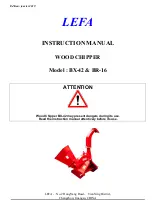
25
English
vicinity of smokers or naked flames.
• If fuel comes into contact with the eyes or is taken internally, obtain medical attention
immediately.
9.3 Preparing the work area
• Clear the area first where the machine is to be used. In addition, the paths along which the
plant trimmings are removed, must be kept clear, thus releasing the operator from the worries
of tripping up over them. The operator must also ensure that his safety is not compromised.
• Make sure to locate the machine such that flying chippings expelled from the discharge blow
chute output do not cause damage to persons or properties.
• Apply the parking brake once the machine has been placed in the working position.
• On slopes, never operate the machine (no forward, backward or lateral slope).
• Make sure to sort the material beforehand. In this way, the operator is sure that no foreign
objects will enter the machine with the material.
• Foreign objects are defined as: any non-organic object or branchy material in excess of the
stated capacity (such as metal, stone, plastic, pvc, cords,…). Some of these can cause serious
damage to your machine or can be ejected, virtually as projectiles towards the user.
• Aways position the machine so that the wind will blow the dust produced away from the engine.
9.4 Starting the Petrol Engine
Caution:
Never start the machine if the engine cooling fins are not clean and free of
debris to protect it form overheating.
Ter informatie:
Also, read the engine manual.
Warning:
Never run the engine indoors. Exhaust gases contain toxic substances and may
lead to intoxication or suffocation.
Before starting the engine, check whether adequate oil and fuel is present in the engine. If
necessary, read the following sections:
“11.3.1 Checking the oil level in the engine cra refilling” on page 47
“9.2 Filling up with petrol” on page 24
















































